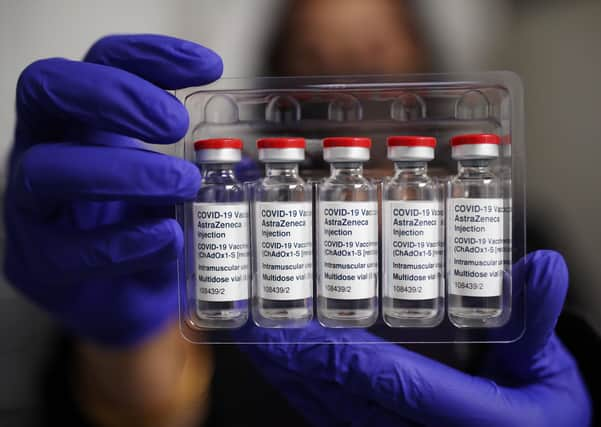Ireland to restrict AstraZeneca jab to the under 60s


The advisory body has recommended restrictions of its use after the European Medicines Agency (EMA) warned that rare blood clots have been associated with Astra Zeneca’s coronavirus vaccine.
In a statement, NIAC said the AstraZeneca coronavirus vaccine “is not recommended for those aged under 60 years including those with medical conditions with very high or high risk of severe Covid-19 disease”.
Advertisement
Hide AdAdvertisement
Hide AdThe advisory body added that the AstraZeneca vaccine should be limited to those “aged 60 years and older”.
NIAC said anyone under the age of 60 who has had their first dose of the AstraZeneca vaccine with a “very high-risk or high-risk medical condition” should receive their second dose 12 weeks later as scheduled.
But anyone aged under 60 who is not considered to be high risk should have the second dose of the vaccine extended to 16 weeks “to allow for further assessment of the benefits and risks as more evidence becomes available”.
Anyone aged 60 and older should receive their second dose of AstraZeneca 12 weeks later as scheduled.
Advertisement
Hide AdAdvertisement
Hide AdIt has raised concerns that any restrictions could affect the country’s vaccine programme.
Speaking on RTE’s Morning Ireland programme, health minister Stephen Donnelly said operational changes would be made if NIAC recommended them.
Mr Donnelly said: “They’ve given guidance previously on various vaccines and age groups and that has all been implemented.
“It comes at a big operational challenge, there’s no question about it.
Advertisement
Hide AdAdvertisement
Hide Ad“But the state has stood up to that challenge each time and maintained a very strong proportion of 95% of vaccines that have come into the country and have been administered, obviously there’s some that are held back for the second doses.
“So we’ll wait to see what NIAC says, and if there are operational changes that need to be made, we will make them.”
NIAC’s advice comes as Ireland began to lift some of its level 5 restrictions.
Monday saw the 5km travel limit relaxed to allow people to travel anywhere within their county, or up to 20km if crossing into another county.
Advertisement
Hide AdAdvertisement
Hide AdPeople from two households will be allowed to meet up outdoors for social and recreational purposes - however, the Government has insisted that private gardens remain off limits.
All schoolchildren are to return to in-class learning from Monday, while construction on housing and essential projects will also resume.
Further easing of restrictions is expected on April 19 and April 26.
Monday also saw a further 394 cases of Covid-19 confirmed in Ireland.
No further deaths linked to the virus were recorded.
Advertisement
Hide AdAdvertisement
Hide AdThe Department of Health said as of 8am there were 227 people with the disease in hospital, 50 of whom were in ICU.
The five-day moving average of new cases is now 404, while the country’s 14-day incidence rate per 100,000 population stands at 131.9.